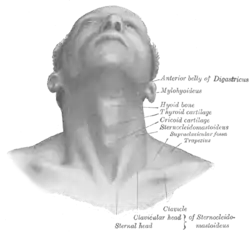Adam's apple
The Adam's apple or laryngeal prominence is the protrusion in the human neck formed by the angle of the thyroid cartilage surrounding the larynx, typically visible in men, less frequently in women.
| Adam’s apple | |
|---|---|
 Front view of the Adam's apple (laryngeal prominence) | |
| Details | |
| Precursor | 4th and 6th pharyngeal arches |
| Identifiers | |
| Latin | Prominentia laryngea |
| TA98 | A06.2.02.003 |
| TA2 | 968 |
| FMA | 55304 |
| Anatomical terminology | |
Structure
The topographic structure which is externally visible and colloquially called the "Adam's apple" is caused by an anatomical structure of the thyroid cartilage called the laryngeal prominence or laryngeal protuberance protruding and forming a "bump" under the skin at the front of the throat. All human beings with a normal anatomy have a laryngeal protuberance of the thyroid cartilage. This prominence is typically larger and more externally noticeable in adult males. There are two reasons for this phenomenon. Firstly, the structural size of the thyroid cartilage in males tends to increase during puberty,[1] and the laryngeal protuberance becomes more anteriorally-focused. Secondly, the larynx, which the thyroid cartilage partially envelops, increases in size in male subjects during adolescence, moving the thyroid cartilage and its laryngeal protuberance towards the front of the neck. The adolescent development of both the larynx and the thyroid cartilage in males occur as a result of hormonal changes, especially the normal increase in testosterone production in adolescent males. In females, the laryngeal protuberance sits on the upper edge of the thyroid cartilage, and the larynx tends to be smaller in size, and so the "bump" caused by protrusion of the laryngeal protuberance is much less visible or not discernible.[2] Even so, many women display an externally visible protrusion of the thyroid cartilage, an "Adam's apple", to varying degrees which are usually minor, and this should not normally be viewed as a medical disorder.
Function
The Adam's apple, in relation with the thyroid cartilage which forms it, helps protect the walls and the frontal part of the larynx, including the vocal cords (which are located directly behind it).
Another function of the Adam's apple is related to the deepening of the voice. During adolescence, the thyroid cartilage grows together with the larynx. Consequently, the laryngeal prominence grows in size mainly in men. Together, a larger soundboard is made up in phonation apparatus and, as a result, men get a deeper voice note.[3][4]
Society and culture
Cosmetic surgery to reshape the Adam's apple is called chondrolaryngoplasty (thyroid cartilage reduction). The surgery is effective, such that complications tend to be few and, if present, transient.[5]
Etymology


The English phrase "Adam's apple" is a calque of Latin pomum Adami, which is found in European medical texts from as early as 1600.[6] The English "Adam's Apple" is found in a 1662 translation of Thomas Bartholin's 1651 work Anatomia.[7]
The 1662 citation includes an explanation for the origin of the phrase: a piece of forbidden fruit was supposedly embedded in the throat of Adam, who according to the Abrahamic religions was the first man:[7]
the common people have a beliefe, that by the judgment of God, a part of that fatal Apple, abode sticking in Adams Throat, and is so communicated to his posterity
This etymology is also proposed by Brewer's Dictionary of Phrase and Fable and the 1913 edition of Webster's Dictionary.[8] The story is not found in the Bible or other Judeo-Christian or Islamic writings.[9]
Linguist Alexander Gode proposed in 1968 that the Latin phrase pomum Adami (literally: 'Adam's apple') was a mistranslation of the Hebrew "tappuach ha adam meaning 'male bump'".[10] The confusion was supposedly due in the fact that in Hebrew language the proper name "Adam" (אדם) literally means "man", and the word for "apple" is similar to the word "tafuach" which means "swollen", thus in combination: the swelling of a man.[11][12]
The medical term "prominentia laryngea" (laryngeal prominence) was introduced by the Basle Nomina Anatomica in 1895.[13]
In the American South, goozle is used colloquially to describe the Adam's apple, likely derived from guzzle.[14][15][16][17]
Additional images
 Laryngeal prominence
Laryngeal prominence Laryngeal prominence
Laryngeal prominence Laryngeal prominence
Laryngeal prominence
See also
References
- "Prominentia laryngea". Medicine Online. Archived from the original on 2013-12-25. Retrieved 2013-02-27.
- "Laringe". Sisbib.unmsm.edu.pe. Retrieved 2013-02-27.
- P. J. Bentley (1980), "Endocrine Pharmacology: Physiological Basis and Therapeutic Applications", CUP Archive, pág 240
- "Pubertad, nuestras diferencias". Esmas.com. Archived from the original on 2004-09-08. Retrieved 2013-02-27.
- Wolfort FG, Dejerine ES, Ramos DJ, Parry RG (1990). "Chondrolaryngoplasty for appearance". Plast. Reconstr. Surg. 86 (3): 464–9, discussion 470. doi:10.1097/00006534-199009000-00012. PMID 2385664.
- du Laurens, André (1600). Historia Anatomica Humani Corporis. Paris. p. 510.
Huius supreme pars βρόγχος, quibusdam vulgò morsus & pomum Adami appelatur.
- Bartholin, Thomas (1662) [1651]. Bartholinus Anatomy. Translated by Culpeper, Nicholas; Cole, Abdiah. London: Peter Cole. p. 123.
That same bunch which is seen on the foreside of the Neck, is called Adams Apple, because the common people have a beliefe, that by the judgment of God, a part of that fatal Apple, abode sticking in Adams Throat, and is so communicated to his posterity
[Protuberantia illa in collo anterius conspicua, dicitur Pomum Adami; [quia vulgo persuasum in Adami faucibus pomi fatalis partem ex pœna Divina remansisse, & ad posteros translatam]] - E. Cobham Brewer (1810–1897). Dictionary of Phrase and Fable. 1898. "Adam's Apple"
- George Crabb (1823), "Universal technological dictionary", Baldwin, Cradock, and Joy, "Pomum Ada'mi"
- Gode, Alexander (1968-10-28). "Just Words". JAMA. 206 (5): 1058. doi:10.1001/jama.1968.03150050046009.
- William S. Haubrich (2003), "Medical Meanings: A Glossary of Word Origins", ACP Press, pág 5.
- "Adam's apple". Medicine.academic.ru. Retrieved 2013-02-27.
- Axel Karenberg, Amor, Äskulap & Co.: klassische Mythologie in der Sprache der modernen Medizin, Schattauer, Stuttgart 2006, S. 128-129.
- Morris, Evan (November 2008). "Goozle « The Word Detective". The Word Detective. Retrieved 22 December 2014.
If we follow 'goozle' back a bit further, we come to an interesting intersection with a far more common word, 'guzzle.'
- Roy Blount Jr. (29 September 2009). Alphabet Juice: The Energies, Gists, and Spirits of Letters, Words, and Combinations Thereof; Their Roots, Bones, Innards, Piths, Pips, and Secret Parts, Tinctures, Tonics, and Essences; With Examples of Their Usage Foul and Savory. Farrar, Straus and Giroux. ISBN 978-1-4299-6042-7.
The Dictionary of Smoky Mountain English defines google (or goozle) as 'the throat, Adam's apple.'
- Roy Wilder (1 September 1998). You All Spoken Here. University of Georgia Press. p. 55. ISBN 978-0-8203-2029-8.
Adam's apple; goozle; the projection formed by the thyroid cartilage in the neck.
- "Goozle". Dictionary of American Regional English. Harvard College. Retrieved 28 November 2020.
The throat as a whole, or spec the gullet, windpipe, or Adam’s apple. chiefly South, South Midland
External links
 Media related to Laryngeal prominence at Wikimedia Commons
Media related to Laryngeal prominence at Wikimedia Commons- lesson11 at The Anatomy Lesson by Wesley Norman (Georgetown University)